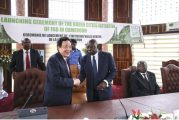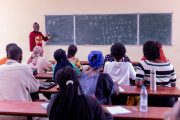Categories
Recent Posts
- Southern Cameroons refugees in Nigeria receive farm seedlings
- Douala: Investment Forum wraps up with honors for investment champions
- Understanding the Biya Francophone regime’s support for the Israeli genocide in Gaza
- US: Prosecution lays out ‘criminal conspiracy’ as Trump’s hush money trial opens
- FAO formally launches Green Cities Initiative in Cameroon
Archives
- April 2024
- March 2024
- February 2024
- January 2024
- December 2023
- November 2023
- October 2023
- September 2023
- August 2023
- July 2023
- June 2023
- May 2023
- April 2023
- March 2023
- February 2023
- January 2023
- December 2022
- November 2022
- October 2022
- September 2022
- August 2022
- July 2022
- June 2022
- May 2022
- April 2022
- March 2022
- February 2022
- January 2022
- December 2021
- November 2021
- October 2021
- September 2021
- August 2021
- July 2021
- June 2021
- May 2021
- April 2021
- March 2021
- February 2021
- January 2021
- December 2020
- November 2020
- October 2020
- September 2020
- August 2020
- July 2020
- June 2020
- May 2020
- April 2020
- March 2020
- February 2020
- January 2020
- December 2019
- November 2019
- October 2019
- September 2019
- August 2019
- July 2019
- June 2019
- May 2019
- April 2019
- March 2019
- February 2019
- January 2019
- December 2018
- November 2018
- October 2018
- September 2018
- August 2018
- July 2018
- June 2018
- May 2018
- April 2018
- March 2018
- February 2018
- January 2018
- December 2017
- November 2017
- October 2017
- September 2017
- August 2017
- July 2017
- June 2017
- May 2017
- April 2017
- March 2017
- February 2017
- January 2017
- December 2016
- November 2016
- October 2016
- September 2016
- August 2016
- July 2016
- June 2016
Featured
 Understanding the Biya Francophone regime’s support for the Israeli genocide in Gaza
Understanding the Biya Francophone regime’s support for the Israeli genocide in Gaza  Poverty under Biya: Cameroonians embrace Chinese language for brighter futures
Poverty under Biya: Cameroonians embrace Chinese language for brighter futures  Cameroon is broken: Who can fix it?
Cameroon is broken: Who can fix it?  Ethiopia: U.S Senator Cardin Statement on the Killing of Bate Urgessa
Ethiopia: U.S Senator Cardin Statement on the Killing of Bate Urgessa  Battle for the Unity Palace: ANNOUNCEMENT!
Battle for the Unity Palace: ANNOUNCEMENT!
Most Commented Posts
 4 Anglophone detainees killed in Yaounde
4 Anglophone detainees killed in Yaounde
19 comments Chantal Biya says she will return to Cameroon if General Ivo Yenwo, Martin Belinga Eboutou and Ferdinand Ngoh Ngoh are sacked
Chantal Biya says she will return to Cameroon if General Ivo Yenwo, Martin Belinga Eboutou and Ferdinand Ngoh Ngoh are sacked
13 comments Anglophone Nationalism: Barrister Eyambe says “hidden plans are at work”
Anglophone Nationalism: Barrister Eyambe says “hidden plans are at work”
12 comments The Anglophone Problem – When Facts don’t Lie
The Anglophone Problem – When Facts don’t Lie
12 comments Largest wave of arrest by BIR in Bamenda
Largest wave of arrest by BIR in Bamenda
10 comments
Latest Tweets
Featured
-

Southern Cameroons refugees in Nigeria receive farm seedlings
-

Douala: Investment Forum wraps up with honors for investment champions
-

Understanding the Biya Francophone regime’s support for the Israeli genocide in Gaza
-

US: Prosecution lays out ‘criminal conspiracy’ as Trump’s hush money trial opens
-

FAO formally launches Green Cities Initiative in Cameroon
-

Football: Barcelona wants Clasico replay if Yamal ‘ghost goal’ call wrong
-

Poverty under Biya: Cameroonians embrace Chinese language for brighter futures
© Cameroon Concord News 2024
12, April 2021
88-year-old Biya’s attempts to get his son to replace him is sparking a rebellion (Video) 0
by soter • Cameroon, Headline News, Politics
Members of the ruling CPDM crime syndicate from the South Region have now been told that the choice of Franck Biya to succeed his father President Biya is mission impossible in the Beti constituency as a planned rally by a prominent administrative officer was boycotted by the elites including traditional rulers.
No one was there to even welcome the governor and the senior divisional officer during the meeting that was supposed to make public the Franck Biya political discourse, according to senior security officials in the South Region.
What followed was a series of drama and uncertainty that included a massive boycott staged by the people of the South Region, a protest statement by the visiting administrative officers and threats of expulsion from the CPDM party.
A video posted online recorded by a senior political elite from the South Region sent cheering crowds into the streets in Ebolowa the chief town in the South Region where thousands are reportedly anticipating the end of the Biya era.
Biya feared, not loved
Cameroon has been touted as an oasis of peace in a desert of chaos for many decades, but for some time now, the country has gradually been ranking itself among the most dangerous, corrupt and chaotic countries to live in as descent and frustration spread across the country like wildfire.
Four years ago, the country’s president, Paul Biya, erroneously declared war on the country’s English-speaking minority which was simply demonstrating to bring its sorry plight to the attention of the government and the international community and what Mr. Biya and his collaborators thought would be wrapped up in a week has now lasted four years with more than 7,000 young Cameroonians already sent to an early grave in a war that has no raison d’etre.
As the government and militia have transformed the country into an open air killing field, the country’s economy has taken a nosedive, with millions of Cameroonians seeking employment and thousands losing their jobs in the country’s two English-speaking regions where the killings are going on unabated.
The number of internally displaced person has continued to swell, while millions have fled to neighboring Nigeria where they are living rough and waiting for the fighting to end for them to return to their country, though their homes have been razed by government soldiers who are wont to inflicting collective punishment on the population each time an army soldier is killed.
But it is not only Southern Cameroons that is going through such an apocalypse. The northern part of the country has been the theater of violent confrontations between government troops and Boko Haram fighters who have bombed many civilians into an early grave.
While the government has been active in the North hoping that it could roll back Boko Haram fighters who are believed to come from Nigeria, government forces have succeeded to alienate Northerner due to massive and bloody killings and abuse of the civilian population which now sympathizes with Boko Haram fighters who are sometimes viewed as liberators.
Noted for its corruption, the government has never really sought to address those issues that are really threatening national unity and integration. The North, like many parts of the country, has been neglected, with very little development projects being implemented in that part of the country.
Tribalism and nepotism are really tearing the country apart as most senior government positions are only occupied by the president’s tribesmen and those loyal to him and his ruling crime syndicate known as the CPDM.
However, it is not the government’s nepotism that is the issue but the results it has posted over the last four decades. Cameroonians would not be bothered if those occupying those strategic positions were really delivering desired results.
While across the country the unemployment rate is high, it is a lot higher in the northern region of the country where there are no companies, no roads, no hospitals and no social services and financial assistance that can even cushion the impact of the economic hardship.
By Soter Tarh Agbaw-Ebai